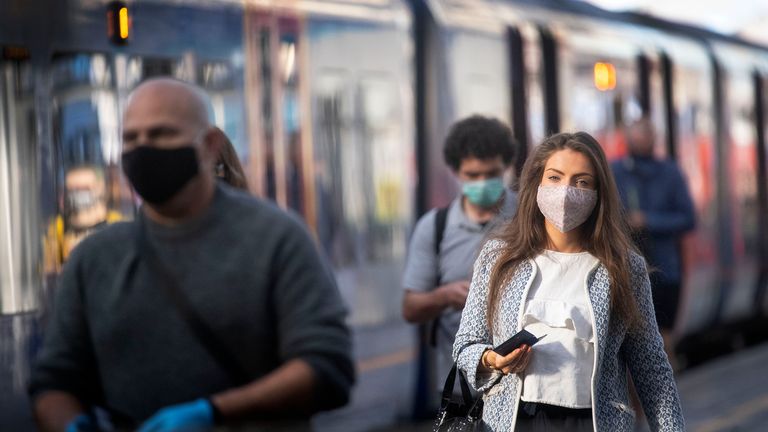Rail fares look set for a sharp increase and second hand car prices are climbing at their steepest rate since 2010, new inflation data suggests.
Figures from the Office for National Statistics (ONS) also showed petrol prices were at their highest level for nearly eight years, pointing to pressure on commuters’ pockets despite a fall in the headline inflation figure.
Consumer prices index (CPI) inflation dropped to a lower than expected 2% last month, down from 2.5% in June, partly thanks to bigger than usual summer fashion store discounts.
Image: Fares rose by 2.6% this yearBut the data was also closely watched for July’s retail prices index (RPI) measure, which is normally used to calculate the following year’s rail fare increases, and came in at 3.8%.
That was the highest level for July since 2011 and would seem to indicate another big hike in prices for season tickets and other regulated train fares in 2022.
AdvertisementThis year’s increase, which took effect in March rather than January, was 2.6%, representing the previous July’s RPI of 1.6% plus one percentage point.
A similar approach this year would see 2022 fares rise by 4.8%.
More from Business House prices hit new record high as stamp duty scramble pumps up market Nando’s forced to close 50 restaurants due to supply chain disruptions US lab reports it is on the cusp of major nuclear fusion breakthrough COVID-19: Job vacancies top one million as economy rebounds from crisis Glencore invests in £4bn British battery project Franco Manca scopes out 150 potential new restaurantsThe government said no decision had yet been made on determining ticket price increases, but that it was “considering a variety of options”.
Motorists are also being hit in the pocket, with petrol prices – at an average of 132.6p per litre last month – at their highest level since September 2013.
Image: Used car prices rose by 14.4% in JulyMeanwhile, second hand car prices have been surging, partly thanks to the increased demand caused by a shortage of semiconductor chips, which is squeezing the supply of new vehicles.
Used car price inflation more than doubled from 5.6% in June to 14.4% in July, the steepest rate recorded since 2010.
It follows a similar and even more pronounced trend that has also been seen in the US.
The slide in the headline annual CPI number reflected a comparison with a period last year when prices were rising as the UK emerged from the first lockdown.
Economists still think inflation will rise sharply over coming months with the Bank of England recently predicting that it would hit 4% later this year.
Last month’s CPI rate was the highest since 2018.
Accelerating price rises are stirring debate about when the Bank should start to ease off on ultra-low interest rates and multi-billion pound asset purchase policies that have helped to cushion the economy against the impact of the pandemic-driven economic downturn.
Officials have been keen to stress what they see as the transitory nature of increasing inflation, skewed by the impact of the crisis as consumer demand for products and services returns and suppliers struggle to catch up.
Investec economist Philip Shaw said: “Today’s figures have provided markets with respite from what has seemed like relentless upside news on inflation.
“However the coming months are likely to see a resurgence as short-term price dynamics, partly stemming from product shortages, reassert themselves.
“October’s hike in utility tariffs will also add to upward pressure.”
